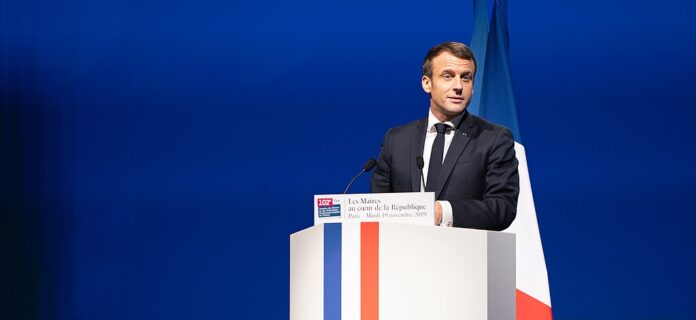Emmanuel Macron’s domestic struggles could undermine his influence in Brussels, creating political instability within the EU
For the European Union, the recent French election results were a mixed bag. While the worst-case scenario of a far-right National Rally majority was avoided, the political landscape in France has been left fragmented and uncertain. Marine Le Pen and Jordan Bardella’s failure to secure a majority in parliament, finishing third behind the left-wing alliance and Emmanuel Macron’s centrist party, brought relief to mainstream pro-Europeans. However, the lack of a clear majority has plunged France into political chaos, which could last for months and have detrimental effects on the EU.
Emmanuel Macron, who has been a significant figure in European politics, pushing for ambitious trade agendas, industrial defence policies, and strategic autonomy, now faces a weakened position at home. This political gridlock means that France’s ability to influence European policies and lead initiatives may be severely hampered. French politicians, aware of the upcoming 2027 presidential election, might prioritize domestic issues over foreign policy, further diminishing France’s clout on the European stage.
Embed from Getty ImagesThe election result has also highlighted the internal struggles within the EU’s key member states. Germany, the other half of the Franco-German engine, is grappling with its own political challenges. Chancellor Olaf Scholz managed to secure a draft budget deal for 2025, temporarily defusing a crisis that could have toppled his government. However, Scholz’s coalition is fragile, and his ability to lead on European issues is limited.
Political analysts and EU officials expressed concern over the potential for stagnation and policy infighting in France, which could stall essential economic and fiscal reforms. This situation is particularly troubling given France’s economic issues and rising national debt. The inability to pass crucial legislation, such as the finance bill, could lead to an economic standstill and exacerbate political paralysis.
The ramifications of this election are expected to be felt in the Council of the EU, where ministers from all member states negotiate on various topics. France’s unclear agenda and diminished diplomatic power could slow down progress on critical issues such as the European Capital Markets Union, a key reform Macron has championed.
Despite the challenges, there are still mechanisms within the French political system that provide checks and balances against radical demands. The Senate, Macron himself, and the French administration and diplomatic corps remain robust entities capable of steering European policy to some extent.
The broader European community has reacted with a mix of relief and apprehension. While the far-right did not gain control, the fragmented parliament poses significant risks. Czech Prime Minister Petr Fiala emphasized that the French president remains one of the strongest political figures in Europe, suggesting that Macron’s influence is not entirely diminished.
Overall, the situation underscores the precarious balance of power within the EU. With both France and Germany facing internal struggles, the question of leadership in Europe remains open. The EU must navigate this period of uncertainty carefully, ensuring that its strategic objectives and cohesive policies are maintained despite the political turbulence in its member states.
Analysis:
Political: The French election gridlock has significant political implications for the EU. Macron’s weakened position at home means he may struggle to maintain his influence in Brussels, potentially leading to a leadership vacuum within the EU. This situation could stall key initiatives and reforms that Macron has championed, such as the European capital markets union and strategic autonomy. The political instability in France, coupled with Germany’s internal challenges, raises concerns about the EU’s ability to present a united front on global issues.
Social: The election results reflect deep divisions within French society. The failure of the far-right to gain a majority is a relief for pro-European factions, but the fragmented parliament indicates a polarized electorate. This polarization could lead to social unrest and further divisions, complicating efforts to achieve consensus on domestic and European policies. The focus on domestic issues over foreign policy may also affect France’s role in addressing broader social challenges within the EU, such as migration and social integration.
Racial: The election’s outcome highlights the ongoing racial and ethnic tensions in France. The rise of far-right parties, even without securing a majority, signals a segment of the population that supports stricter immigration policies and nationalist rhetoric. This dynamic could influence France’s stance on EU policies related to immigration and integration, potentially creating friction with other member states that advocate for more inclusive approaches. Addressing these racial and ethnic tensions will be crucial for maintaining social cohesion and unity within France and the EU.
Gender: It also plays a role in the political landscape. Women’s participation and representation in the fragmented parliament will be essential for ensuring that gender perspectives are considered in policy-making. The election results could impact the advancement of gender equality initiatives, both domestically and within the EU. Political instability might divert attention from critical gender-related policies, such as equal pay and women’s rights, highlighting the need for continued advocacy and focus on these issues.
Economical: The election gridlock poses risks for France and the EU. The inability to pass key legislation, such as the finance bill, could lead to economic stagnation and increased national debt. This situation is particularly concerning given France’s significant role in the EU’s economic framework. The political uncertainty could deter investments and slow down economic growth, affecting not only France but also its trade partners within the EU. Ensuring economic stability will require effective governance and cooperation, even in the face of political challenges.
